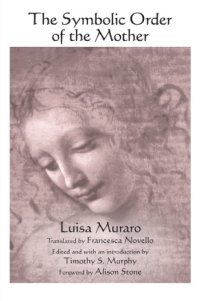
Ebook: The Symbolic Order of the Mother
Author: Luisa Muraro, Timothy S. Murphy
- Series: SUNY series in Contemporary Italian Philosophy
- Year: 2018
- Publisher: SUNY Press
- Language: English
- pdf
Argues that affirming the irreducible differences between men and women can lead to more transformative politics than the struggle for abstract equality between the sexes.
In The Symbolic Order of the Mother Luisa Muraro identifies the bond between mother and child as ontologically fundamental to the development of culture and politics, and therefore as key to achieving truly emancipatory political change. Both corporeal development and language acquisition, which are the sources of all thinking, begin in this relationship. However, Western civilization has been defined by men, and Muraro recalls the admiration and envy she felt for the great philosophers as she strove to become one herself, as well as the desire for independence that opposed her to her mother. This conflict between philosophy and culture on the one hand and the relationship with the mother on the other constitutes the root of patriarchy’s symbolic disorder, which blocks women’s (and men’s) access to genuine freedom. Muraro appeals to the feminist practice of gratitude to the mother and the recognition of her authority as a model of unconditional nurture and support that must be restored. This, she argues, is the symbolic order of the mother that must overcome the disorder of patriarchy. The mediating power of the mother tongue constitutes a symbolic order that comes before all others, for both women and men.
Luisa Muraro is Professor Emeritus of Philosophy at the University of Verona, Italy. Francesca Novello is an instructor at the University of Oklahoma. Timothy S. Murphy is Houston-Truax-Wentz Professor and Regents Professor of English at Oklahoma State University.
In The Symbolic Order of the Mother Luisa Muraro identifies the bond between mother and child as ontologically fundamental to the development of culture and politics, and therefore as key to achieving truly emancipatory political change. Both corporeal development and language acquisition, which are the sources of all thinking, begin in this relationship. However, Western civilization has been defined by men, and Muraro recalls the admiration and envy she felt for the great philosophers as she strove to become one herself, as well as the desire for independence that opposed her to her mother. This conflict between philosophy and culture on the one hand and the relationship with the mother on the other constitutes the root of patriarchy’s symbolic disorder, which blocks women’s (and men’s) access to genuine freedom. Muraro appeals to the feminist practice of gratitude to the mother and the recognition of her authority as a model of unconditional nurture and support that must be restored. This, she argues, is the symbolic order of the mother that must overcome the disorder of patriarchy. The mediating power of the mother tongue constitutes a symbolic order that comes before all others, for both women and men.
Luisa Muraro is Professor Emeritus of Philosophy at the University of Verona, Italy. Francesca Novello is an instructor at the University of Oklahoma. Timothy S. Murphy is Houston-Truax-Wentz Professor and Regents Professor of English at Oklahoma State University.
Download the book The Symbolic Order of the Mother for free or read online
Continue reading on any device:

Last viewed books
Related books
{related-news}
Comments (0)